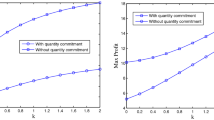Abstract
Considering a one-supplier and two-retailer supply chain setting in which the supplier makes contacts with retailers in sequence based on FCFS (first–come–first-service) principle, the authors investigate the marginal effect of extra-gain guilty fairness concerns of supply chain members on the contract design, supply chain’s profit and profit distribution. When the supplier considers distributional fairness of loss aversion and extra-gain guilty, extra-gain guilty concern reduces the optimal wholesale and retail price, and improves supply chain performance. When the first or the second retailer considers distributional fairness and peer-induced fairness, extra-gain guilty concerns decrease the optimal wholesale and retail price but increase the profit of all supply chain members only when the level of loss aversion is large enough and the level of extra-gain guilty is less than 1/2. However, when the level of loss aversion is small and the level of extra-gain guilty is less than 1/2, extra-gain guilty has no influence on supply chain performance. The analysis reveals that the supply chain performance can be further improved by considering fairness of extra-gain guilty.
Similar content being viewed by others
References
Bolton G E and Ockenfels A, ERC: A theory of equity, reciprocity, and competition, American Economic Review, 2000, 90(1): 166–193.
Charness G and Rabin M, Understanding social preferences with simple tests, Quarterly Journal of Economics, 2002, 117(3): 817–869.
Fehr E and Schmidt K M, A theory of fairness, competition and cooperation, Quarterly Journal of Economics, 1999, 114(3): 817–868.
Ho T H and Su X, Peer-induced fairness in games, American Economic Review, 2009, 99(5): 2022–2049.
Ho T H, Su X, andWu Y, Distributional and peer-induced fairness in supply chain contract design, Production and Operations Management, 2014, 23(2): 161–175.
Cui, T H, Raju J S, and Zhang Z J, Fairness and channel coordination, Management Science, 2007, 53(8): 1303–1314.
Caliskan-Demirag O, Chen F, and Li J, Channel coordination under fairness concerns and nonlinear demand, European Journal of Operational Reaserch, 2010, 207(3): 1321–1326.
Katok E and Pavlov V, Fairness in supply chain contracts: A laboratory study, Journal of Operations Management, 2013, 31(1–2): 129–137.
Loch C H and Wu Y, Social preferences and supply chain performance: An experimental study, Management Science, 2008, 54(11): 6–38.
Hu W and Li J, Disposing the leftovers under the consignment contract with revenue sharing: Retailer vs supplier, Journal of Systems Science and Complexity, 2012, 25(2): 262–274.
Bian J, Lai K K, and Hua Z, Manufacturers’ channel competition with retailer demand-enhancing service, Journal of Systems Science and Complexity, 2015, 28(4): 887–906.
Lim N and Ho T H, Designing price contracts for boundedly rational customers: Does the number of blocks matter?, Marketing Science, 2007, 26(3): 312–326.
Katok E, Olsen T, and Pavlov V, Wholesale pricing under mild and privately known concerns for fairness, Production and Operations Management, 2014, 23(2): 285–302.
Author information
Authors and Affiliations
Corresponding author
Additional information
This research was partially supported by the National Natural Science Foundation of China under Grant Nos. 71571079, 71301122, 71671133, 71131004, and Program for New Century Excellent Talents in University under Grant No. NCET-13-0228.
This paper was recommended for publication by Editor LI Jian.
Rights and permissions
About this article
Cite this article
Li, J., Fan, X. & Dai, B. Fairness of extra-gain guilty in performance of supply chain and contract design. J Syst Sci Complex 30, 866–882 (2017). https://doi.org/10.1007/s11424-017-5133-9
Received:
Revised:
Published:
Issue Date:
DOI: https://doi.org/10.1007/s11424-017-5133-9




